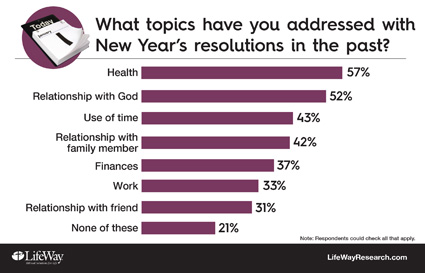NASHVILLE, Tenn.—In January, Americans resolve to cut the carbs, hit the gym—and get right with God.
When they make New Year’s resolutions, a better relationship with God ranks almost as high as better health, Nashville-based LifeWay Research finds.
 And for many groups, faith actually outranks health. Older Americans, African-Americans, Hispanics and Christians all are more likely to say they’ve made resolutions about God than about health.
And for many groups, faith actually outranks health. Older Americans, African-Americans, Hispanics and Christians all are more likely to say they’ve made resolutions about God than about health.
Overall, 57 percent of Americans report making health-related New Year’s resolutions in the past, while 52 percent say they’ve addressed their relationship with God. Those are the top two responses in a LifeWay Research survey of 1,000 U.S. adults.
“We don’t hear a lot of talk about it, but a relationship with God is still something people want,” said Scott McConnell, vice president of LifeWay Research.
“They have time at the holidays to think, and they realize what they didn’t do last year—things they value but are not living out. So, they start the year with an aspiration to change.”
Topics of resolve
While health and faith are the leading topics for New Year’s resolutions, Americans also report addressing their use of time (43 percent), relationships with a family member (42 percent), finances (37 percent), work (33 percent) and relationships with a friend (31 percent).
Many of the issues overlap as people aspire to improve themselves, McConnell said.
Sign up for our weekly edition and get all our headlines in your inbox on Thursdays
“Use of time is probably the best measure of priorities,” he said. “And investing in a relationship with God may encourage people to address other priorities as well, such as spending time with family or fixing their finances.”
However, more than one in five Americans (21 percent) say they haven’t made New Year’s resolutions on any of the topics.
Men appear less resolution-minded than women, according to the survey. Fully a quarter of men report no resolutions, compared to 17 percent of women. Meanwhile, women are more likely than men to say they’ve made resolutions about their health (62 percent vs. 52 percent), relationship with God (58 percent vs. 47 percent) and use of time (47 percent vs. 39 percent).
Resolutions of faith
Americans with evangelical beliefs are among the most likely to make New Year’s resolutions about their relationship with God, the survey shows. Faith trumps health by a wide margin for them: Seventy-two percent say they have made resolutions regarding God, while 56 percent have addressed their health.
Most evangelical believers (51 percent) also report New Year’s resolutions about their use of time.
“For an evangelical, faith should be integrated into every area of life,” McConnell said. “Not every resolution will be about having a relationship with God, but their relationship with God should be affecting what they do in other areas.”
In contrast, only 43 percent of those who do not hold evangelical beliefs have made New Year’s resolutions about their relationship with God, and 39 percent have addressed their use of time.
Resolutions about a relationship with God are widespread among African-Americans (73 percent) and Hispanics (63 percent). In addition, 61 percent of Christians, 59 percent of Southerners, and 56 percent of Americans 55 and older say they have made resolutions regarding God.
“In January we always hear about health-related resolutions. We don’t hear as much about people’s concern for their relationship with God,” McConnell said.
“But this research shows faith has a prominent place in New Year’s resolutions. Many people want to take steps to make God a greater part of their lives.”
Researchers conducted the phone survey of Americans Sept. 14-28 using Random Digit Dialing. Fifty percent of completes were among landlines and 50 percent among cell phones. Analysts used maximum quotas and slight weights for gender, region, age, ethnicity and education to reflect the population more accurately. The completed sample is 1,000 surveys. The sample provides 95 percent confidence the sampling error does not exceed plus or minus 3.6 percent. Margins of error are higher in sub-groups.
















We seek to connect God’s story and God’s people around the world. To learn more about God’s story, click here.
Send comments and feedback to Eric Black, our editor. For comments to be published, please specify “letter to the editor.” Maximum length for publication is 300 words.